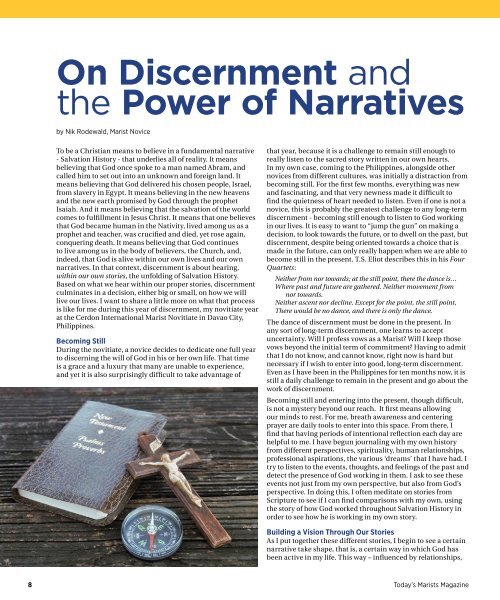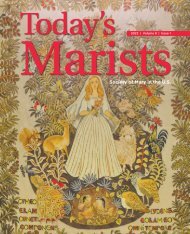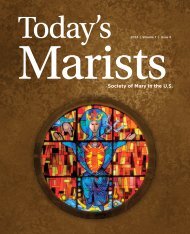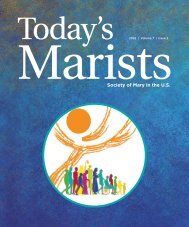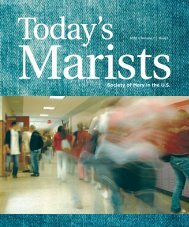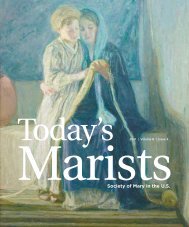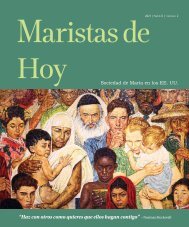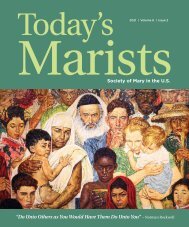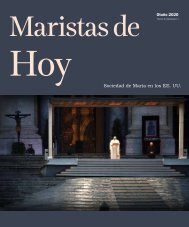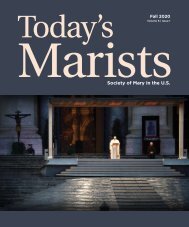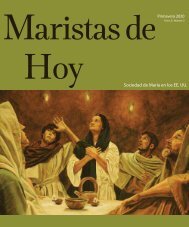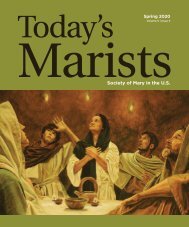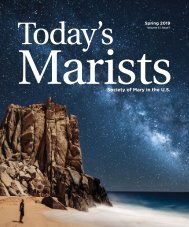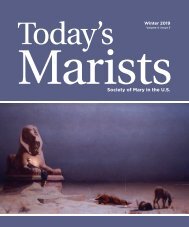Today's Marists V.5 Issue 2 FALL 2019
Create successful ePaper yourself
Turn your PDF publications into a flip-book with our unique Google optimized e-Paper software.
On Discernment and<br />
the Power of Narratives<br />
by Nik Rodewald, Marist Novice<br />
To be a Christian means to believe in a fundamental narrative<br />
- Salvation History - that underlies all of reality. It means<br />
believing that God once spoke to a man named Abram, and<br />
called him to set out into an unknown and foreign land. It<br />
means believing that God delivered his chosen people, Israel,<br />
from slavery in Egypt. It means believing in the new heavens<br />
and the new earth promised by God through the prophet<br />
Isaiah. And it means believing that the salvation of the world<br />
comes to fulfillment in Jesus Christ. It means that one believes<br />
that God became human in the Nativity, lived among us as a<br />
prophet and teacher, was crucified and died, yet rose again,<br />
conquering death. It means believing that God continues<br />
to live among us in the body of believers, the Church, and,<br />
indeed, that God is alive within our own lives and our own<br />
narratives. In that context, discernment is about hearing,<br />
within our own stories, the unfolding of Salvation History.<br />
Based on what we hear within our proper stories, discernment<br />
culminates in a decision, either big or small, on how we will<br />
live our lives. I want to share a little more on what that process<br />
is like for me during this year of discernment, my novitiate year<br />
at the Cerdon International Marist Novitiate in Davao City,<br />
Philippines.<br />
Becoming Still<br />
During the novitiate, a novice decides to dedicate one full year<br />
to discerning the will of God in his or her own life. That time<br />
is a grace and a luxury that many are unable to experience,<br />
and yet it is also surprisingly difficult to take advantage of<br />
that year, because it is a challenge to remain still enough to<br />
really listen to the sacred story written in our own hearts.<br />
In my own case, coming to the Philippines, alongside other<br />
novices from different cultures, was initially a distraction from<br />
becoming still. For the first few months, everything was new<br />
and fascinating, and that very newness made it difficult to<br />
find the quietness of heart needed to listen. Even if one is not a<br />
novice, this is probably the greatest challenge to any long-term<br />
discernment - becoming still enough to listen to God working<br />
in our lives. It is easy to want to “jump the gun” on making a<br />
decision, to look towards the future, or to dwell on the past, but<br />
discernment, despite being oriented towards a choice that is<br />
made in the future, can only really happen when we are able to<br />
become still in the present. T.S. Eliot describes this in his Four<br />
Quartets:<br />
Neither from nor towards; at the still point, there the dance is…<br />
Where past and future are gathered. Neither movement from<br />
nor towards.<br />
Neither ascent nor decline. Except for the point, the still point,<br />
There would be no dance, and there is only the dance.<br />
The dance of discernment must be done in the present. In<br />
any sort of long-term discernment, one learns to accept<br />
uncertainty. Will I profess vows as a Marist? Will I keep those<br />
vows beyond the initial term of commitment? Having to admit<br />
that I do not know, and cannot know, right now is hard but<br />
necessary if I wish to enter into good, long-term discernment.<br />
Even as I have been in the Philippines for ten months now, it is<br />
still a daily challenge to remain in the present and go about the<br />
work of discernment.<br />
Becoming still and entering into the present, though difficult,<br />
is not a mystery beyond our reach. It first means allowing<br />
our minds to rest. For me, breath awareness and centering<br />
prayer are daily tools to enter into this space. From there, I<br />
find that having periods of intentional reflection each day are<br />
helpful to me. I have begun journaling with my own history<br />
from different perspectives, spirituality, human relationships,<br />
professional aspirations, the various ‘dreams’ that I have had. I<br />
try to listen to the events, thoughts, and feelings of the past and<br />
detect the presence of God working in them. I ask to see these<br />
events not just from my own perspective, but also from God’s<br />
perspective. In doing this, I often meditate on stories from<br />
Scripture to see if I can find comparisons with my own, using<br />
the story of how God worked throughout Salvation History in<br />
order to see how he is working in my own story.<br />
Building a Vision Through Our Stories<br />
As I put together these different stories, I begin to see a certain<br />
narrative take shape, that is, a certain way in which God has<br />
been active in my life. This way – influenced by relationships,<br />
8 Today’s <strong>Marists</strong> Magazine


